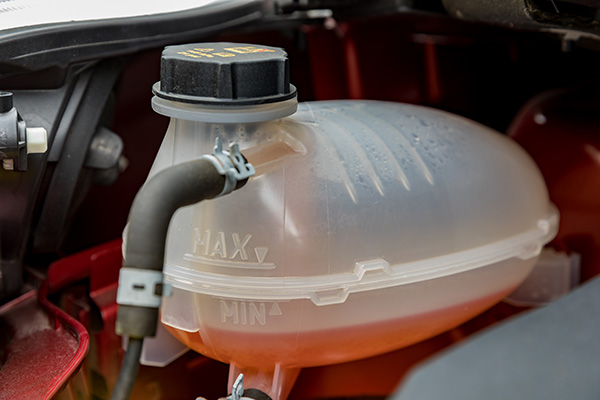
You’re parked in your usual spot and notice a small puddle of bright green or orange liquid under your car. Or maybe you’ve topped off your coolant once or twice recently and assumed it was nothing. If the leak seems minor and your car still runs, it’s easy to think you can put off repairs until later. But that could be a risky choice.
Coolant is your engine’s primary defense against overheating. Even a small leak can lead to big problems if left unchecked. While your vehicle might seem fine for now, it’s running closer to a critical temperature threshold than you may realize.
What Happens When You Lose Coolant
Coolant flows through your engine and radiator, absorbing excess heat and maintaining the engine's proper operating temperature. When coolant levels drop due to a leak, the system becomes less efficient. Over time, even a minor leak can reduce the coolant level enough to cause hot spots in the engine or trigger the temperature gauge to spike.
An engine running too hot will eventually overheat, especially in traffic or on long drives. Once that happens, you risk damaging vital components like the head gasket, pistons, and cylinder walls. The result can be anything from reduced performance to total engine failure.
How to Spot a Minor Leak
Not all leaks leave a noticeable puddle. Some coolant may evaporate as it leaks onto hot engine parts. Others might seep slowly from a hose or gasket and drip intermittently. If you’ve found yourself topping off the coolant more than once without a clear explanation, a slow leak is likely.
Other signs include a slightly sweet smell around the engine bay, white exhaust smoke (in the case of internal leaks), or a damp residue on hoses or near the radiator. Your temperature gauge may also fluctuate more than usual or sit slightly higher than normal.
Where Minor Leaks Commonly Occur
Coolant can escape from a variety of places in the engine. Common culprits include:
- Cracked or loose hoses
- A failing radiator cap
- A leaking water pump
- A degraded heater core
- Damaged gaskets or seals
Even a worn-out hose clamp can allow coolant to seep out slowly. These parts wear over time due to heat cycles, pressure, and age. California’s variable coastal climate and engine strain from steep city streets can accelerate this wear.
What Are the Risks of Waiting Too Long
Driving with a small coolant leak may seem harmless at first, especially if your temperature gauge stays in the normal range. But leaks rarely fix themselves. What starts as a manageable drip can quickly turn into a major failure if the weakened part gives way under pressure.
Overheating doesn’t always happen suddenly. It can build over time, gradually damaging your engine’s internals. And because many drivers don't look at the temperature gauge frequently, the signs may go unnoticed until it’s too late.
In worst-case scenarios, a simple leak left unaddressed can spiral into a cracked head, warped engine parts, or a completely seized engine.
What You Should Do If You Suspect a Leak
The best course of action is to have the system inspected as soon as possible. Even if you top off the coolant and see the warning light go away, it’s important to identify where the fluid is going.
A pressure test can help locate slow leaks that aren’t visible. If it’s an external leak, replacing a hose or gasket is often quick and inexpensive. Catching a water pump or radiator issue early can also prevent roadside breakdowns and expensive engine repairs.
Protect Your Engine with Help from Taylormade Automotive in San Francisco, CA
In a city full of hills, traffic, and stop-and-go driving, your engine works hard every day. It relies on a healthy cooling system to stay efficient and reliable. A minor leak may not stop your car today, but over time, it can take a serious toll.
If you’ve noticed low coolant levels, a small puddle under your car, or any signs of a possible leak, bring your vehicle to Taylormade Automotive in San Francisco, CA. Our team will diagnose the issue, repair the leak, and make sure your cooling system is functioning properly. Don’t take a chance on an overheated engine, and get peace of mind today.